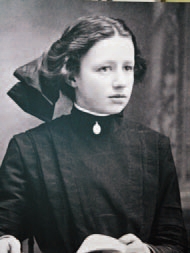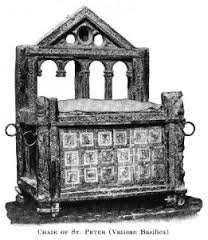Blessed Dina Belanger (+1929) is a home-grown Canadian saint whom we commemorate today. (The martyr Andre Grasset, whom we celebrated two days ago, is still a beatus). Born April 30th, 1897 in St. Roch, Quebec, now a suburb of the capital city, Dina was baptized a few hours later. (After all, why wait?) From an early age, she displayed remarkable musical aptitude, and, by hard work and discipline, developed into a concert pianist, performing in the United States and Canada.
But earthly success was not enough; It was also at a young age, praying before the Blessed Sacrament, that she had consecrated herself and all her talents privately to Christ, a vow which was soon to flower into a vocation to the religious life.
Dina signified clearly the daily battle required to practise ‘heroic virtue’, to dig deep, and not just avoid the obvious vices Christ condemns, but pull up even their smallest and seemingly insignificant manifestations of sin by their very roots, with consistent victories over self. This was instilled in her early by her devout parents, her mother teaching her to make the sign of the cross early, and Dina always loved the Angelus, mocked by the virulent anti-Catholic fellow Canadian Margaret Atwood in The Handmaid’s Tale. Dina would run downstairs to join in when the bell tolled. Would that our culture still maintained that fine tradition of commemorating the Incarnation and Our Lady’s fiat, at least at noon, if not three times a day! Where I live, the church down the road has the Angelus tolled at noon everyday, and I can only wonder what great good it does, even for those who know not what it means.
Dina’s parents encouraged her to pay attention at Mass, a nearly thankless task for all those with small children. Her mother hid the ceramic doll with which Dina was enamored. When the young girl threw one of her tantrums at this – to which she was, like nearly all children, quite disposed to get her way – her father got up from the table and joined in. Dina was so mortified at seeing her dear Dad act so pathetically, she never succumbed to another.
And, as she grew, she learned more and more to internalize this discipline. When another Sister complained about her piano playing – which, we may surmise, was quite flawless – Dina not only did not allow oneself to feel upset, but, by an act of will, rejoiced that her fellow religious may just have said something sort of true, which would help her grow in virtue. Perhaps that trill was a bit off, and that C# held just a little too long…
She strove for absolute perfection even in the smallest of things, seeing in each action the weight of eternity. This made her an excellent pianist – each key pressed just right, and led to the ultimate perfection of the consecrated life, offering herself on August 11, 1920 as a postulant to the Religieuses de Jésus-Marie (Religious Congregation of Jesus and Mary, which still has 1300 members throughout the world), taking the fitting religious name of Marie de Sainte-Cécile de Rome, giving piano lessons to young girls as part of her apostolate. One wonders what it took for a master musician to master the patience to watch and encourage endless streams of beginners stumbling over their D major scales.
In this environment Dina strove even more for sanctity, beloved by all, but not standing out, nor conspicuous. She was just like everyone else, the other Sisters recalled after her death, only somehow, in some not-quite definable way, more perfect, never losing her temper, nor gossiping, just quiet and unassuming. But behind that humble exterior was a soul forged in the fires of sanctity, in long years of prayer, grace and discipline.
In 1923, Sister Cecile contracted scarlet fever from a student, which developed into fatal tuberculosis. She offered up every ounce of her sufferings for the love of God and His Christ, Who would reveal Himself to her, and with whom she would speak interiorly. She was asked by her superiors to write her autobiography, which, as Christ prophesied to her in a vision, would do much good, as it indeed has. She died at the age of 32, surrounded by her sisters, on this day, September 4th, 1929.
Alas, even the intercession of Blessed Dina, and all the panoply of Canadian beati et sancti could not save Quebec, which abandoned the Faith in the revolution tranquil three decades after Dina’s death. Once a Catholic bastion producing untold numbers of vocations, the land dotted with glorious convents, seminaries, churches, Quebec is now by and large bereft. Many of these majestic buildings still dot the beautiful landscape of la belle province, but they are mostly converted into apartments, discotheques or maintained as museum pieces. Reading her life, and of the province once steeped in Catholicism in which she grew up, is like reading of the Middle Ages, an era that seems gone forever.
But is it? As Saint Augustine describes his own conversion, God draws us to Himself as ‘beauty ever ancient, ever new…’, and, who knows, someday even Quebec, and Canada, may rediscover their Catholicism, which is to say, rediscover themselves.
There are still those with eyes to see and ears to hear that beauty, which is the beauty of holiness, too often obscured, but still there, nonetheless; the light shines in the darkness, and the darkness has not overcome it. May we pray with and to Blessed Dina today that such clarity as she had is given to many more.
Dina was beatified by a fellow saint, Pope John Paul II, on March 20, 1993, with whom she now rejoices – and intercedes – for Quebec, for Canada, and for all of us, in heaven.
Perhaps listen to a little piano music, maybe some of Dina’s own (for she also composed); or, better yet, play some, today in her honour.
Bienheuruex Dina, pries pour nous!











